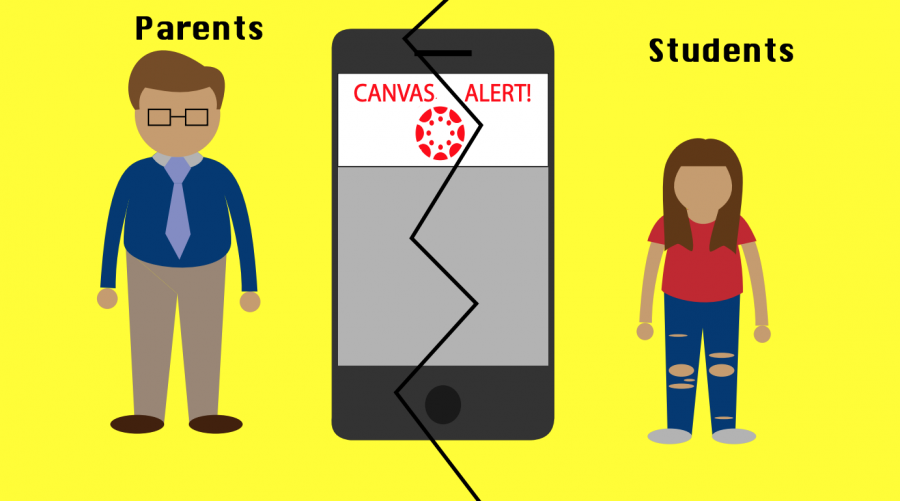Parental access to Canvas takes toll on students
February 14, 2019
The car ride home from school was once a sanctuary from the day’s toll. I would often shut away any thoughts of school while my mom and I would listen to music.
Now that car ride is like a stressful interrogation where I’m bombarded with questions about my grades. I imagine I’m not the only one who endures painful daily questioning as a result of parents having access to Canvas.
Now that parents have access to Canvas, they receive an email every time their kid gets even a relatively insignificant homework grade. Though seemingly a good idea, the constant alerts of grades being entered tends to cause more problems than benefits. Of course, parents want to see their kids succeed and do well, and allowing the adults to monitor their kids’ grades gives parents the opportunity to catch their child struggling before it is too late to change anything.
However, from the students’ perspective, this is an invasion of their privacy and takes away their control and ability to make their own academic decisions. Students already don’t have much privacy to begin with considering that they live in the same house as their parents and often have limited say in the decision that go on in their lives.
For me, sharing grades before report cards or progress reports used to be a decision I made; it was something I could decide whether or not to tell my parents. If I received one bad grade but knew I could bring it up, I would keep it to myself rather than cause them to get worried or upset.
Now, whenever a bad grade is entered into Canvas, it isn’t the student who brings up their grade first. It is their parents. This system where parents are privy to every grade their child receives does not allow for kids to explain the reason for the bad grade. By being the first to explain the bad grade, parents are more likely to listen to their child’s reasoning rather than writing it off as an excuse.
Furthermore, with parents always bringing up bad grades, it potentially damages the relationship between them and their child. Instead of looking forward to a place to escape from the stress, some students now dread coming home the day they receive a bad test grade, knowing their disappointed parent will be waiting for them at the door.
Additionally, Canvas does not provide context for parents, and sometimes when an assignment shows up missing they immediately ask their kids to do it, even if nothing was missing in the first place. The grade simply hasn’t been entered yet, or there was a mistake the teacher made.
Parents also may not understand the way the grading system works, causing unneeded distress. Forgetting one homework assignment at the beginning of a term can drop a student’s grade drastically, but within a few weeks when there are more assignments, that one bad grade will be much less significant. Parents often do not know this and before the school day even ends, teachers and students alike are getting angry calls or emails from parents.
We are high schoolers now, not elementary kids. It is more on us as students to learn how to deal with bad grades as later in life we’ll have to make even greater decisions. Instead of being notified after every grade, parents should have limitations on their ability to monitor their kids’ grades by only notifying them when a student constantly receives bad grades. Students’ grades are important but they are between students and teachers.
Parental access to canvas does not benefit parents or students as it takes away students’ abilities to make their own decisions and communicate with their parents responsibly. Yes, parents should be notified if their child is consistently struggling in a class, but they do not need to see every single grade that their child receives.











O • Sep 14, 2022 at 11:36 am
true
anonymous • Feb 14, 2019 at 11:50 pm
spot on — I felt the same way. thanks for writing this!
Elijah Cohen-Gordon • Feb 14, 2019 at 7:07 pm
This is absolutely correct – great piece Aaliyah!